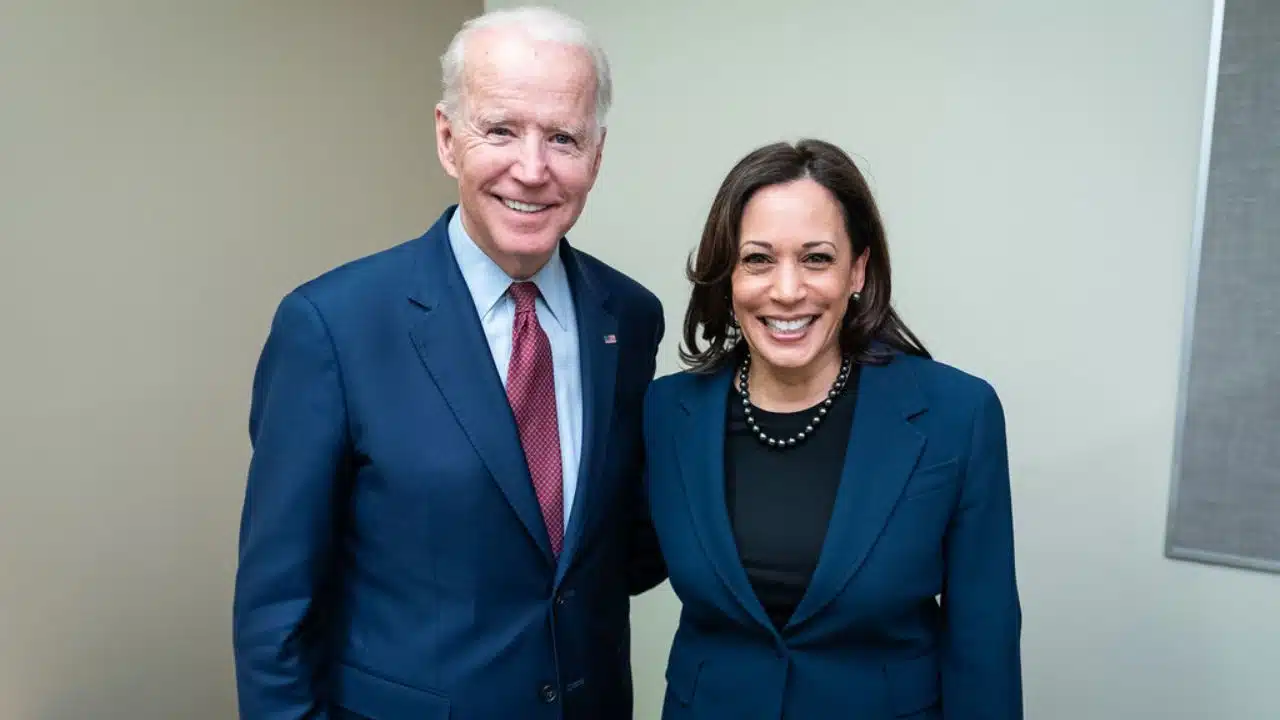In a surprising turn of events, U.S. President Joe Biden announced his withdrawal from the 2024 presidential race on Sunday, endorsing Vice-President Kamala Harris as the Democratic Party’s nominee.
This decision comes after a recent debate with Donald Trump, which raised concerns about Biden’s ability to continue in office. Biden emphasized that his decision to step down was made in the country’s best interest, stating that his primary focus now is to fulfill his duties as President for the remainder of his term.
He highlighted his choice of Kamala Harris as his Vice President in 2020 as one of his best decisions, reflecting his confidence in her leadership abilities. Biden’s statement called for unity within the Democratic Party to defeat Donald Trump in the upcoming elections.
This move has sparked a significant shift in the political landscape, setting the stage for Harris to become the first Indian-origin woman to contest the U.S. presidential elections. The President’s decision marks a pivotal moment in his career and U.S. politics, emphasizing his dedication to the nation’s best interests over personal ambition.
A Selfless Decision for the Country
President Biden, in his statement, emphasized that his decision to step down was made in the country’s best interest.
“My fellow Democrats, I have decided not to accept the nomination and to focus all my energies on my duties as President for the remainder of my term. My first decision as the party nominee in 2020 was to pick Kamala Harris as my Vice President. And it’s been the best decision I’ve made,” the 81-year-old President said in a post on X.
— Joe Biden (@JoeBiden) July 21, 2024
Biden’s statement highlighted his commitment to serving the American people and ensuring that the Democratic Party presents a united front against the Republican nominee, Donald Trump.
He urged the Democratic Party to unite and support Harris, stating, “Today, I want to offer my full support and endorsement for Kamala to be our party’s nominee this year. Democrats — it’s time to come together and beat Trump. Let’s do this.” This endorsement is seen as a strategic move to strengthen the party’s chances in the upcoming election, with Biden prioritizing the nation’s future over his re-election bid.
Kamala Harris Honored and Determined
Vice President Kamala Harris expressed her gratitude for Biden’s endorsement, calling his decision a “selfless and patriotic act.” She stated her commitment to earning and winning the nomination, highlighting Biden’s “extraordinary leadership” and her intent to carry forward his legacy.
Harris, if nominated, will become the first Indian-origin woman to contest the U.S. presidential elections. Harris said in her statement, “I am honored to have the President’s endorsement and intend to earn and win this nomination. I will do everything in my power to unite the Democratic Party — and unite our nation — to defeat Donald Trump and his extreme Project 2025 agenda.”
Harris’s response underscores her readiness to lead and determination to unite the Democratic Party and the nation against Trump. Her endorsement by Biden boosts her campaign and solidifies her position as a critical figure in the Democratic Party, poised to make history if she secures the nomination and wins the election.
Reactions from Political Figures
The announcement of Biden’s withdrawal and endorsement of Harris triggered a wave of reactions from political figures. Former President Barack Obama, Senate leader Chuck Schumer, and House Speaker Nancy Pelosi praised Biden’s decision and acknowledged his accomplishments.
Obama expressed his extraordinary confidence in the emergence of an outstanding nominee, although he did not explicitly endorse Harris. Schumer and Pelosi lauded Biden’s decision as a demonstration of his dedication to the country and the Democratic Party.
Prominent figures like California Governor Gavin Newsom and Michigan Governor Gretchen Whitmer, who were considered potential contenders for the nomination, have thrown their support behind Harris.
Newsom described Biden as selfless and endorsed Harris as fearless and tenacious. Whitmer emphasized her commitment to supporting Harris and stopping Trump. This broad support from influential Democrats suggests a substantial likelihood of party unity behind Harris, strengthening her campaign as she prepares for the Democratic National Convention.
Republican Response
On the other hand, Republicans, including Donald Trump, criticized Biden’s move. Trump labeled Biden as “not fit to run” and demanded immediate resignation. The Republican National Convention saw Trump solidify his position as the Republican nominee, further intensifying the political landscape.
Trump reacted to Biden’s decision by calling the president “the worst president in the history of the United States by far.” In a fundraising email, Trump’s campaign claimed that Biden “quit the race in complete disgrace.” This response highlights the deep political divisions and sets the stage for a contentious election battle.
Trump’s criticism reflects his strategy to capitalize on Biden’s withdrawal to energize his base and undermine the Democratic Party’s new frontrunner, Kamala Harris. The intense reactions from both sides underscore the high stakes of the upcoming election and the polarizing nature of the current political climate in the United States.
Unifying the Democratic Party
Biden urged the Democratic Party to unite behind Harris to ensure victory against Donald Trump in the upcoming elections. The Democratic National Committee (DNC) swiftly moved to amend the names of its fundraising committees to the Harris Victory Fund and Harris Action Fund.
Two major Democratic donors, LinkedIn co-founder Reid Hoffman and investor Alexander Soros, publicly endorsed Harris, signaling a consolidation of support within the party. This immediate shift of endorsements and financial backing underscores the party’s commitment to presenting a unified front.
Biden’s call for unity is a strategic move to bolster Harris’s campaign and rally the party’s base ahead of the election. The quick alignment of crucial figures and donors behind Harris indicates a strong potential for party cohesion, which is critical in mobilizing voters and securing victory in the general election. This unification effort is pivotal for the Democratic Party as it transitions from Biden’s leadership to Harris’s candidacy.
Weeks of Intense Scrutiny
Biden’s decision followed weeks of intense scrutiny and pressure from Democratic lawmakers and party officials. His weak performance in the first presidential debate against Trump increased concerns about his ability to lead the party to victory.
Biden faced further criticism after a high-profile summit with NATO leaders where he mistakenly introduced Ukrainian President Volodymyr Zelensky as “President Putin” and appeared to refer to Harris as “Vice President Trump.”
These missteps fueled doubts about his cognitive abilities and fitness for office. The scrutiny and pressure culminated in his decision to withdraw from the race, prioritizing the party’s chances of success over his re-election bid.
This intense examination of Biden’s performance and health has significantly influenced the political landscape, leading to a critical moment in the Democratic Party’s strategy for the 2024 election. Biden’s withdrawal and endorsement of Harris aim to address these concerns and refocus the party’s efforts on securing a victory against the Republicans.
Preparing for the Convention
The focus now shifts to the Democratic National Convention, scheduled for August. Although Harris is expected to be the front-runner, she must secure the official nomination from the party delegates. Prominent Democrats like California Governor Gavin Newsom and Michigan Governor Gretchen Whitmer have already voiced their support for Harris, indicating a possible unification behind her candidacy.
The DNC’s swift actions to rebrand fundraising efforts in Harris’s name reflect a strategic move to consolidate resources and support. As the party prepares for the convention, the emphasis will be on rallying the delegates and ensuring a smooth transition from Biden to Harris.
This process involves securing the nomination, uniting the party’s factions, and building a solid campaign platform. The convention will be a critical moment for the Democratic Party as it seeks to present a cohesive and compelling alternative to the Republican ticket.
The preparations and decisions made in the lead-up to the convention will play a crucial role in shaping the party’s chances in the 2024 election.
Biden’s Legacy and Future
President Biden’s decision to end his re-election campaign marks an abrupt and humbling conclusion to his half-century-long political career. He mounted four presidential bids, spent 36 years in the U.S. Senate representing Delaware, rose to the chairmanships of the robust Judiciary and Foreign Relations committees, and served eight years as Barack Obama’s vice president.
In his statement on Sunday, Biden expressed his gratitude towards Harris, calling her an “extraordinary partner.” He also thanked the American people for their faith and trust. “I believe today and always have, that there is nothing America can’t do – when we do it together. We must remember we are the United States of America,” Biden said.
Significant legislative achievements and a commitment to public service mark his legacy. As he prepares to focus solely on his presidential duties for the remainder of his term, Biden aims to ensure a smooth transition and support Harris in her bid to lead the country.
His decision reflects a deep sense of duty and a willingness to prioritize the nation’s future over personal ambition.
Summary
President Joe Biden’s withdrawal from the 2024 presidential race marks a significant moment in U.S. politics. His endorsement of Kamala Harris sets the stage for a historic election, with Harris potentially becoming the first female and first Indian-origin President of the United States.
As the Democratic Party rallies behind Harris, the nation watches closely, anticipating the next chapter in this dramatic race for the White House. Biden’s decision to step down and endorse Harris underscores his commitment to the country’s best interests and the Democratic Party’s success.
This pivotal moment in the election cycle will shape the future of American politics and determine the nation’s direction. The focus now shifts to Harris as she prepares to lead the party and campaign against Donald Trump.
The coming months will be critical as the Democratic Party unites, strategizes, and mobilizes to secure a victory in the 2024 election. The nation awaits the outcomes of these developments, poised for a potentially transformative election.


































